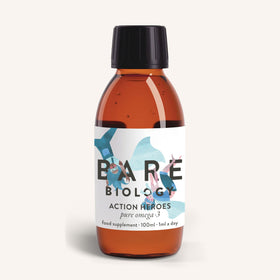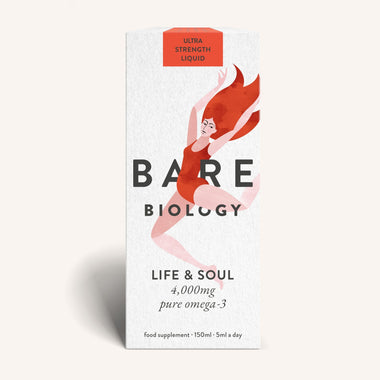Who should take omega-3 fish oil?
CONTENTS
Omega-3 fish oil is a fantastic nutrient. From before we’re born through to our golden years, this essential fatty acid has a role to play at every stage of our lives.
And while other supplements fall in and out of fashion faster than you can say “activated charcoal”, omega-3 is here to stay. First discovered in the late 1920s, the essential fatty acid really entered the public consciousness in the 1970s when researchers discovered that Greenland Inuits, who consumed vast amounts of oily fish, didn’t have the levels of cardiovascular disease we suffered from in the West.
These days omega-3 is one of the best-researched supplements on the planet. With benefits that range from the cosmetic (who doesn’t want younger-looking skin?) to the physiological (from maintaining normal blood pressure to keeping your eyes healthy), it’s tempting to think we should all be taking omega-3 by the tablespoon. But is that really the case?
So who needs omega-3 fish oil in their lives and is there anyone who really shouldn’t be taking it? Read our guide to find out.

Should I take omega-3 supplements?
If you’re already eating the kind of diet a nutritional therapist would be proud of you may think that taking a fish oil supplement really isn’t for you. Surely it’s best just to get your omega-3 by eating the fish itself, rather than taking it as a supplement?
Well, yes and no. While it is true that supplements can’t undo the effects of a poor diet, very few of us are able to eat the recommended amount of oily fish we need for good general health.
Both the NHS and the Scientific Advisory Committee on Nutrition (SACN) say we should all aim for two 140g portions of fish a week, one white (like cod) and one oily (like mackerel). This would give you a weekly omega-3 intake of around 3,150mg. Unfortunately, most of us fail to get even that modest amount, with only 27% of UK adults eating oily fish regularly according to the SACN.

What are omegas good for?
If you were hoping to see some physical benefits from eating oily fish, like maintaining a healthy heart you’d need to eat much more than this. A European Food Standards Authority-approved health claim suggests taking 3,000mg for the maintenance of normal blood pressure.
To get anywhere near those sorts of levels would mean eating far more than the current recommended amounts of oily fish. From mackerel to salmon, oily fish contains low levels of pollutants that build up in the body over time. For this reason, healthy adults shouldn’t eat more than four portions per week, while women who are pregnant or breastfeeding shouldn’t eat more than two.
Taking a pure, safe fish oil supplement like our high strength Life & Soul Omega 3 fish oil ensures you’re getting all the health benefits of omega-3, without the risk of pollutants such as PCBs or heavy metals like mercury.
We bare all. So you can relax.
Should I give omega-3 fish oil supplements to my kids?
These days we don’t see fish as a particularly child-friendly food unless it’s covered in breadcrumbs. But we really should because Omega 3 is used for your child’s rapidly growing brain and nervous system.
The human brain increases in mass by 3.5 times by the age of five. To do this it needs copious amounts of the omega-3 fatty acid docosahexaenoic acid (DHA). DHA is the major building block of the brain used to build its 100 billion cells and neurons.
Children should be getting at least 140g of Omega 3 per week. But according to the latest National Diet and Nutrition Survey, average intakes are just 18g per week for kids, only an eighth of the recommended 140g.
Can I take omega-3 while pregnant?
Unlike cod liver oil supplements which aren’t recommended for pregnancy due to their levels of Vitamin A, it’s safe to take an omega-3 fish oil when pregnant. And it’s not just safe, it’s a good idea…
DHA is essential for the proper growth and development of your tiny embryo’s eyes and brain. And all of this omega-3 has to come from you. Your body prioritises your own omega-3 to give to your growing bump, meaning your own levels can become seriously depleted. That’s why it’s a good idea to keep taking an omega-3 fish oil supplement after giving birth, even if you’re not breastfeeding.

“Omega-3 is vital to our health and well being, every cell in the body is dependent upon it for their function.”
Jackie McCusker, Nutritional Therapist at the University of Westminster’s Be Well London Clinic

Who should take omega-3 fish oil supplements?
You should take omega-3 if your diet’s not as good as it should be.
Most modern diets contain high levels of omega-6 which is in virtually all processed foods from crisps to granola, and the vegetable oils we cook with at home. This sheer volume of omega-6 is crowding the omega-3 out of our diets and that’s a problem.
Even if you have a healthy diet you may still be eating too much omega-6 without realising it. Locally sourced, organic rapeseed oil seems like a healthy choice, but it’s chock-full of omega-6. Fresh meat from your butcher will contain omega-6, unless it’s from grass fed animals, as cows and chickens are frequently fed corn and soy which are high in omega-6 and low in omega-3s. Even those healthy nut butters and vegetable crisps are high in omega-6 fats.
Around 150 years ago the ratio of omega-3 to 6 in our diets was 1:1 but now it’s closer to 1:15 and as high as 1:25 in the US. If you know your diet’s not as good as it should be you’ll need even more omega-3 to try to redress the balance. And it’s also a good idea to try to reduce the amount of omega-6 you’re eating at the same time.
As Dr Loren Cordain PhD, professor emeritus at the Department of Health and Exercise Science at Colorado State University, says, “Omega-3 restores the balance of fatty acids that our genus (homo) evolved with over millions of years of evolutionary experience.”

You should take omega-3 if you have an omega-3 deficiency
The best way to find out is to consult a fully qualified nutritional practitioner, who can refer you for a blood test to measure the EFAs in your red blood cells.
You should take omega-3 to maintain certain organs
The EFSA (European Food Safety Authority) has approved the claims that omega-3 fatty acids can help maintain your heart, eyes and blood pressure, although you could need high doses for up to three months before you feel the benefit. Especially if your diet and lifestyle are not the healthiest.
You should take omega-3 if you’re an athlete
It’s not just people with health problems or deficiencies that need to take a supplement. There is much research into the positive effects omega-3 can have on athletes. One study by the Centre for Human Nutrition, Division of Geriatrics and Nutritional Sciences at Washington University School of Medicine, found that taking an omega-3 supplement led to a 50% increase in the up-regulation of mTOR, which is the genetic signalling pathway that stimulates lean muscle growth.
According to Dr Marc Bubbs, a naturopathic doctor, strength coach and author in Canada, if you’re an athlete or just training intensely, fish oil supplements can be a “game changer”.
Who shouldn’t take omega-3?
Although fish oils are generally safe for everyone to take, if you’re on medication you should always consult your doctor before taking any supplement that’s not prescribed for you. And there’s also a range of people who should exercise some extra caution before taking omega-3.
People with diabetes
In some diseases such as diabetes, omega-3 supplementation needs to be used with caution as it may increase fasting blood sugar levels. Talk to your doctor if you are taking medications to lower your blood sugar.
People on blood-thinning medication
If you’re taking warfarin, aspirin, plavix or other medications with blood-thinning properties, you should consult your GP first as omega-3s may be contraindicated.
Professor Lesley Braun, a senior research fellow at the department of medicine at Monash University in Melbourne, said, “Omega-3 notionally has the potential to influence blood-clotting mechanisms, making blood less likely to clot. This would have implications for gastric bleeding, risk of haemorrhagic stroke etc. However, this potential effect is thought not to be significant in daily life."
People with certain food allergies
Clearly you shouldn’t take a fish oil supplement if you are allergic to fish. But what if you’re allergic to shellfish? It all depends on the severity of your allergy. Fish oil does not contain the proteins from the flesh of shellfish, but there is a remote possibility that it may have traces of tiny molecules of the proteins, according to the Food Allergy Initiative.
You should also be cautious if you have a severe nut allergy. Rare incidences of skin rashes have been reported among people taking supplements who had other food allergies.


So, should we all take omega-3 fish oil?
“The membrane of every cell is made up of lipids (phospholipids and cholesterol), proteins and carbohydrate groups,” explains Jackie McCusker, nutritional therapist at the University of Westminster’s Be Well London clinic. “Omega-3 EFAs represent about 20% of the phospholipids and are therefore an integral component of the cell membrane.”
When you realise how ‘essential’ these fatty acids are for our body it seems incredible that we don’t all eat oily fish at every meal. Although of course, that could expose us to worrying levels of toxins. And that’s where a safe, pure supplement like Life & Soul Omega 3 fish oil from Bare Biology comes in.
But remember there’s no such thing as a one-size-fits-all approach when it comes to your health. If you’re on blood-thinning medication, have diabetes or suffer from a food allergy, it’s a good idea to talk to your doctor before taking an omega-3 supplement.









